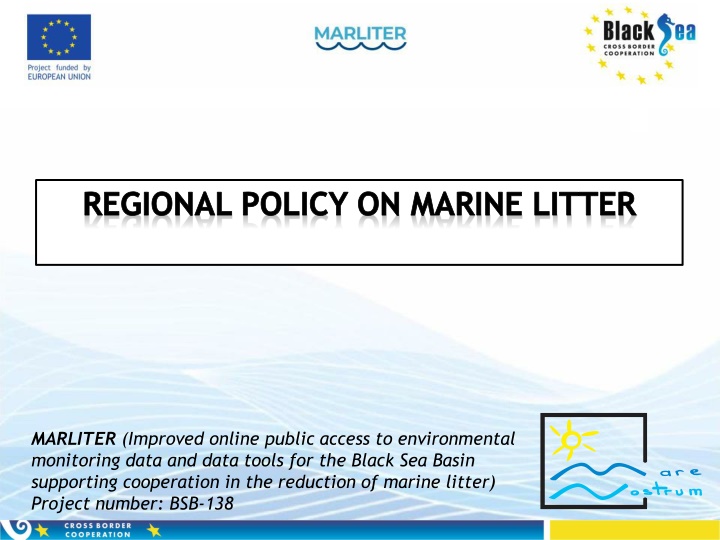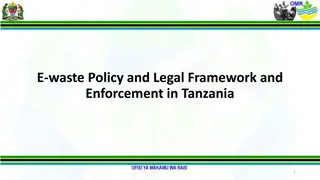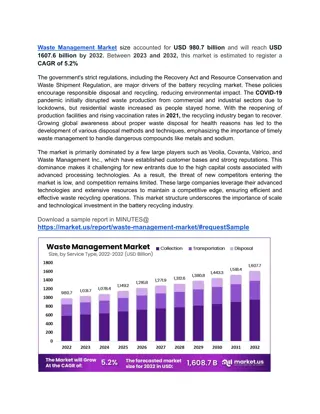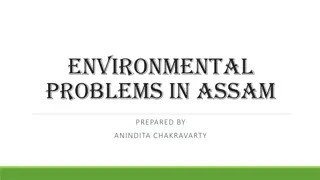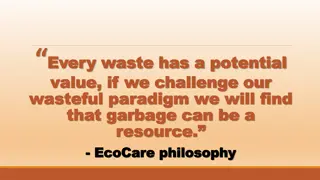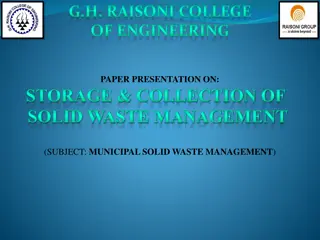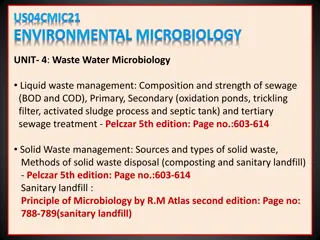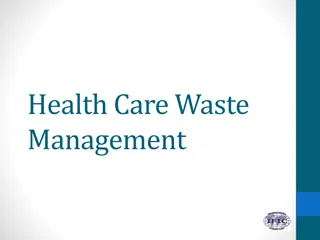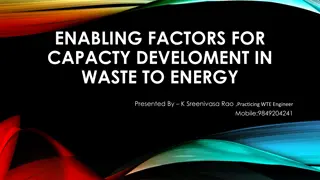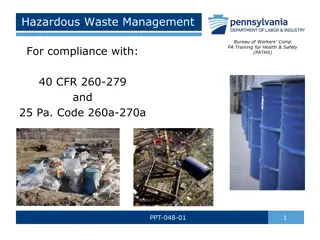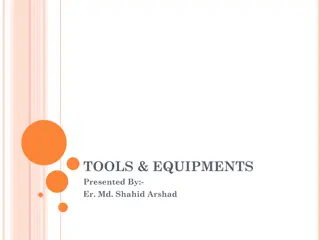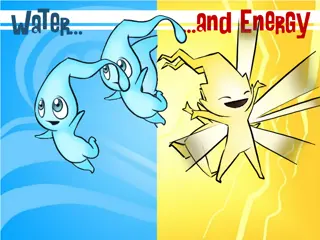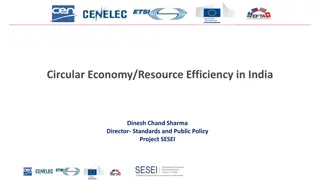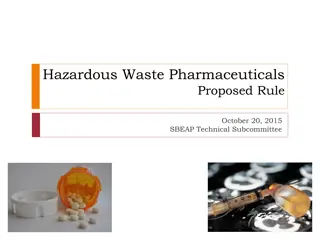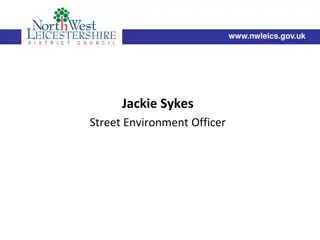European Union Regulations and Directives on Marine Litter and Waste Management
Marine litter poses a significant threat to the marine environment, prompting the adoption of various international, regional, and national instruments to address the issue. Key directives such as the Marine Strategy Framework Directive and Waste Framework Directive set out measures to achieve good environmental status and promote sustainable waste management practices within the European Union. These directives emphasize waste prevention, recycling, and safe disposal to combat marine litter effectively.
Download Presentation

Please find below an Image/Link to download the presentation.
The content on the website is provided AS IS for your information and personal use only. It may not be sold, licensed, or shared on other websites without obtaining consent from the author.If you encounter any issues during the download, it is possible that the publisher has removed the file from their server.
You are allowed to download the files provided on this website for personal or commercial use, subject to the condition that they are used lawfully. All files are the property of their respective owners.
The content on the website is provided AS IS for your information and personal use only. It may not be sold, licensed, or shared on other websites without obtaining consent from the author.
E N D
Presentation Transcript
REGIONAL POLICY ON MARINE LITTER MARLITER (Improved online public access to environmental monitoring data and data tools for the Black Sea Basin supporting cooperation in the reduction of marine litter) Project number: BSB-138
Marine litter is a huge problem and a large number of instruments have been adopted at international, regional and national level to solve it. REGULATIONS CONVENTIONS AGREEMENTS STRATEGIES ACTION PLANS LAWS PROGRAMMES These contain specific management measures that are mandatory or voluntary.
Marine Strategy Framework Directive(2008/56/EC) It is the best known directive that aims to protect the marine environment. This obliges the Member States of the European Union to take a series of measures to achieve or maintain a good environmental status (GES) in the marine environment by 2020. Marine litter is the tenth of the 11 qualitative descriptors that claim that their properties and contamination do not cause harm to the coastal and marine environment Based on this, several measures were developed and implemented that aimed to reduce the number of marine debris, but also to prevent their occurrence.
Waste Framework Directive (2008/98/EC) It paved the way for a new perspective on waste management. It establishes the extended responsibility of the manufacturer and describes a number of innovative and powerful factors for stimulating sustainable production, taking into account the entire product life cycle. This directive requires Member States to develop waste prevention programs, including specific prevention objectives, implemented and made public.
The European Union's approach to waste management is based on three main lines of action: Waste prevention related directly to the improvement of the production methods, as well as the determination of the consumers to change their consumption habits, finally generating smaller quantities of waste; 1. Recycling and recovery encouraging the recovery of the component materials and their recycling. 2. Final disposal of waste at this stage the waste cannot be recovered, and these must be eliminated from the perspective of safety for the environment, but also for human health, with a strict monitoring program. 3.
Packaging and Packaging Waste Directive (94/62/EC) This directive can have an extremely high impact on marine litter, given that packaging occupies a leading place in the top 10 common litter encountered on the Black Sea beaches. Source: Marine Litter Watch If all Member States were to implement this directive, the amount of waste from plastic packaging would decrease significantly, and they would no longer be in the top 10 items at Black Sea.
Taking action on plastics has been identified as a priority in the Action Plan for a Circular Economy aimed at accelerating the transition to the circular economy, stimulating global competitiveness, promoting sustainable economic growth and creating new jobs. In circular economy, from products at end of life materials are recovered through recycling and dismantling, which are then "reused" as raw materials for other products at the beginning of the lifecycle.
In this way, the waste and their impact on the environment are reduced, but also reductions in production costs are obtained. The circular economy means "closing the loop" of the value chain, from production to consumption, through repair and refabrication activities, waste management and secondary raw materials, which are reintroduced into the economy.
Single use plastics The first European strategy for plastics in a circular economy, adopted in January 2018, has transformed the way plastics are designed, produced, used and recycled within the European Union. Did you know that by 2030, all plastic packaging needs to be recyclable?
Single use plastics In March 2019, the European Parliament agreed on disposable plastic items and fishing gear, addressing the 10 most common items on Union beaches. Did you know that the main measures required are : - Prohibition of selected single-use plastic products for which there are alternatives on the market: ear sticks, cutlery, plates, straw, mixing sticks, glasses, food containers and expanded polystyrene drinks and oxo-degradable plastic products; - Measures to reduce the consumption of food containers and glasses for beverages, as well as the specific marking or labeling of certain products; - A target of 90% selective collection for plastic (pet) bottles by 2029 (77% by 2025), as well as the target of incorporating 25% of recycled plastic into the manufacture of new pet bottles, starting in 2025 When implemented, these measures will bring benefits to both the environment and the economy, such as avoiding the production of 3.4 million tonnes of CO2. - and 30% from 2030.
Landfill Directive (1999/31/EC) It establishes technical requirements for the operation of landfills to limit the final disposal of waste through landfills and environmental impact. However, the European Commission acknowledged that about 1,000 landfills in the EU are sub-standard, and the actual number is probably much higher. to reduce their
Water Framework Directive (2000/60/EC) This directive requires that all surface waters (including rivers, estuaries and coastal waters) achieve "good ecological status". However, although rivers are a source of marine waste, they are not a good ecological criteria. As a result, Member States are not directly required to take measures to reduce the amount of waste in their rivers.
Urban Waste Water Treatment Directive (91/217/EEC) It regulates the discharge of wastewater, industrial wastewater and stormwater in order to reduce pollution in fresh, estuarine and coastal waters. Urban waste water is a source of marine waste, items such as sanitary towels, tampons, condoms, ear sticks, microplastics from cosmetics and fibers from clothes washing.
Joint Operational Programme Black Sea Basin 20142020 The publication is edited by the Mare Nostrum NGO. Constanta, April 2020 Joint Operational Programme Black Sea Basin 2014 2020 is co-financed by the European Union through the European Neighbourhood Instrument and by the participating countries: Armenia, Bulgaria, Georgia, Greece, Republic of Moldova, Romania, Turkey and Ukraine. This publication has been produced with the financial assistance of the European Union. The contents of this publication are the sole responsibility of the Mare Nostrum NGO and can in no way be taken to reflect the views of the European Union.
